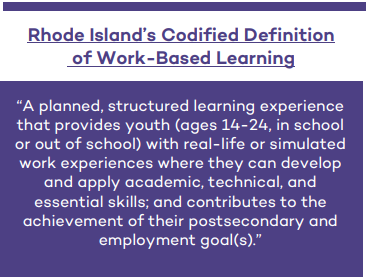Rhode Island’s intentional approach to closing access and attainment gaps in its work-based learning programs is a model that state policymakers can apply to their own education and workforce programs.
(Download)
Background & Introduction

The National Governors Association Center for Best Practices has assisted 23 states and territories in their efforts to scale high-quality work-based learning programs since 2016. Rhode Island has been engaged with the Policy Academy on Scaling Work-Based Learning since 2017 – the same year that state policymakers launched an initiative aimed at improving youth career readiness called PrepareRI. The Office of the Governor and key state agencies such as the Rhode Island Department of Education (RIDE) lead PrepareRI’s operations, which include collaboration with businesses and non-governmental organizations. One of PrepareRI’s main goals is to ensure all high school students have access to high-quality work-based learning opportunities, as defined by the Governor’s Workforce Board. PrepareRI has also undertaken multiple adjoining initiatives to ensure historically underserved student populations have greater access to and success in programs that help prepare them for well-paying, in-demand jobs. Rhode Island’s intentional approach to closing access and attainment gaps in its work-based learning programs is a model that state policymakers can apply to their own education and workforce programs.
Rhode Island’s Equity Grant Program
In 2012, RIDE enacted new regulations aimed at strengthening the state’s career and technical education (CTE) systems. Since these regulatory changes were made, PrepareRI has made additional efforts to ensure its CTE systems ably serve student populations who have been traditionally underrepresented in its programs. This includes Rhode Island’s Perkins V plan, which was approved by the U.S. Department of Education in June 2020 and features an equity-centered strategy for improving CTE programs.
Policymakers created the Equity Grant program to address access and achievement gaps in CTE and to bolster the equity-centered vision of Rhode Island’s Perkins V plan. Equity Grants, which are financed by reserve funds authorized in the Perkins V statute, are awarded to local education agencies (LEAs) that meet certain eligibility requirements through a competitive application process. Funds from Equity Grants may be used to establish a new CTE program or to make improvements to an existing program.
Application Process
LEAs applying for Equity Grants must outline suspected root causes of access and attainment gaps, provide evidence for their existence, and describe how they seek to close these gaps with Perkins V funding.
Requirements:
- The application must include a plan to expand access to CTE programs for student populations that are currently underrepresented.
- Applicants must provide a 25 percent match.
- Applicants must provide assurance that they will not reduce the amount of federal, state or local support for the proposed program or other CTE programs.
Proposed programs must also fit the Governor’s Workforce Board definition of a priority industry, be in alignment with Rhode Island’s CTE Board Standards, and address an access or achievement gap identified in PrepareRI’s analyses of 2015-16 CTE enrollment data.
PrepareRI’s analyses revealed equity gaps in its CTE programs among five student populations:
- English language learners: 5 percent of high school students in Rhode Island identified as having Limited English Proficiency, but only 1 percent of students with Limited English Proficiency completed a CTE program.
- Female students: girls made up no more than 15 percent of students enrolled in priority industry programs including STEM, transportation, manufacturing and construction.
- Students who have a disability: 15 percent of Rhode Island high schoolers had an Individualized Education Program (IEP), but fewer than 5 percent of students who completed a CTE program in STEM, health science and finance had an IEP.
- Students of color: 40 percent of high school graduates in Rhode Island were students of color, but students of color made up less than 10 percent of those enrolled in STEM, business management and marketing CTE programs.
- Students from a low-income background: 47 percent of Rhode Island students were eligible for free and reduced lunch , but fewer than 20 percent of students enrolled in STEM and business management programs came from a low-income background.
Selected LEAs are required to measure their progress in closing gaps for both access and completion among the population of historically underrepresented students they are serving.
Future Efforts
Eight LEAs were awarded Equity Grants in 2018, and each of the historically underrepresented student populations identified in RIDE’s 2015-16 analyses were served by the new program. Five grantees launched new efforts, including a work-based learning construction program at the East Providence Career and Technical Center. Other industries represented included information technology, health care, finance, environmental science and pre-engineering. Equity Grants are set to remain a significant part of PrepareRI’s forthcoming strategic plan, which will include a new goal that every high school graduate in Rhode Island complete a high-quality work-based learning experience.
The Rhode Island Department of Education will incorporate stakeholder feedback and evaluate outcomes from the original cohort of grantees to improve their grantmaking processes and resource allocations. These improvements will include a more robust and supportive system for monitoring progress and providing technical assistance for grantees. RIDE also plans to create Professional Learning Communities for Equity Grant recipients, which will offer LEAs a regular opportunity to share best practices and discuss common challenges.
Conclusion
Rhode Island’s decision to put equity at the core of its Perkins V Plan is a practice that states can consider as they develop and amend their own congressionally mandated plans. Moreover, PrepareRI’s allocation of resources to programs created for traditionally underserved students offers state policymakers a replicable framework for advancing equity in work-based learning programs.
Author
Jack Porter, Policy Analyst, NGA Center for Best Practices.












